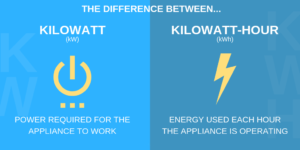 People looking for solar options often puzzled with terms kilowatt and kilowatt-hours. Electricity used is measured by kilowatt hour and the solar power systems are sized in kilowatts. This is where questions often come about kilowatts and kilowatt-hours.
People looking for solar options often puzzled with terms kilowatt and kilowatt-hours. Electricity used is measured by kilowatt hour and the solar power systems are sized in kilowatts. This is where questions often come about kilowatts and kilowatt-hours.
So what exactly does a kWh mean and how does it differ from a kilowatt (kW)?
A kilowatt is a measure of how much power (capacity) a device can provide; kilowatt-hours define the amount of work performed in one hour of time or amount of energy used to do that work. A 1.5 kilowatt (1500 W capacity) kettle will boil the same amount of water faster than a 1 kilowatt (1000 watt capacity) kettle. Regardless of the power of the kettles, energy needed to boil the same amount of water is the same. In this case, energy is provided by electricity and the amount of electricity used by both kettles to boil the water is the same.
Energy use and kWh in context
Say 1.5 kilowatt (1.5KW) kettle took 0.5 hours (30 minutes) to boil the water, electricity used = 1.5 X 0.5 = 0.75 kwhr; unit of measure for electricity (energy) is kwhr. We know smaller kettle takes longer to boil the water; how long? We know electricity (energy) used by both kettles are the same; 1 X T = 0.75, T = 0.75 hours (45 minutes), 1-kilowatt kettle will take 45 minutes to boil the same amount of water.
Why kWh matter when you’re going solar
The Net Metering program allows offsetting the electricity purchased from the utility company with solar electricity during twelve consecutive months. To do this as solar energy solutions providers we need to size the solar power system that is able to produce the amount of electricity a customer use in twelve consecutive months. Electricity bill report usage in kwhr, and when evaluating solar installation to offset this electricity we talk about the size of the solar power system needed in kW.
In the earlier example, we talked about how a 1,000-watt kettle will use 1 kilowatt-hour in one hour of use. When talking about solar, the process of converting power capacity (watts) into expected energy output (kWh) is not as simple due to a number of factors. One thing is certain: a kettle will consume power at a constant rate regardless of whether or not you live in Toronto or California, if it’s raining or if it’s placed on a certain type of countertop. Whereas solar panels output is greatly affected by the environment and circumstances it is installed.
Factors such as the angle and orientation of the roof and the amount of sunlight hours in the town solar panels are located will significantly impact how much electricity it will produce. So, for example, a solar panel on the north side of a roof will produce than the same panel on the south side of the roof because south facing roofs typically receive higher sunlight exposure.
Those wondering how much a solar installation would cost to offset the electricity bill, complete the Free solar Assessment request at our website e or give us a call at 416-855-9377.
We are one of the top solar energy companies providing solutions that are second to none. We provide energy solutions across Toronto, Markham, Mississauga, Burlington, Oakville, Brampton, Vaughan, Ajax, Pickering, Whitby, Oshawa, Caledon, Stouffville, Richmond Hill, Newmarket, Aurora, Milton, Georgetown, and the Greater Toronto Area (GTA).





